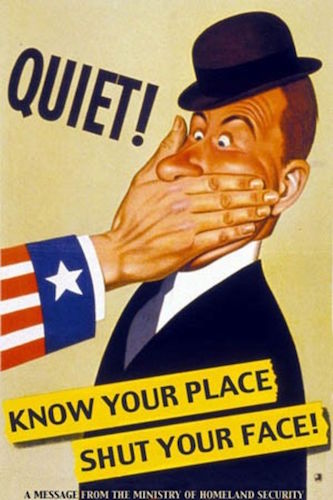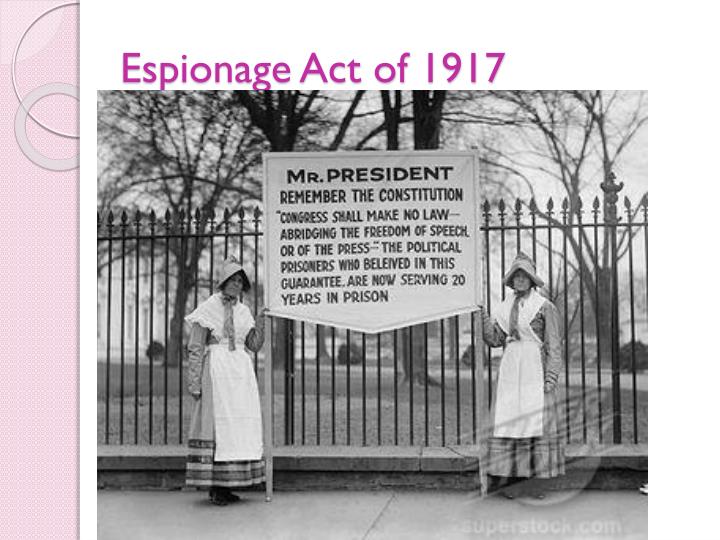

In May 2019, a federal grand jury in Virginia issued an indictment against Wikileaks founder Julian Assange that included 17 counts of violation of the Espionage Act for receiving and publishing classified documents. Snowden sought asylum in Russia, but could be prosecuted under the charges if he returned to the United States. Many news outlets published the information from the documents, including the New York Times, Washington Post and NBC News. In more recent years, former CIA analyst Edward Snowden was charged with violating the Epionage Act after he leaked classified documents related to the National Security Agency's widespread surveillance program in 2013, beginning with The Guardian. The charges were ultimately dropped in 2009. Two former lobbyists for the American Israel Public Affairs Committee (AIPAC) were charged with violating the Espionage Act of 1917 in August 2005. (Image via Wikimedia Commons, CC BY 2.0) People still being charged under Espionage Act In this photo, Snowden speaks with Chris Anderson and Tim Berners Lee on a telepresence robot, beaming in from a secret location in Russia. Former CIA analyst Edward Snowden was charged with violating the Epionage Act of 1917 after he leaked classified documents related to the National Security Agency's widespread surveillance program in 2013. The judge eventually dismissed charges against him and his colleague Anthony Russo.
#Espionage act trial
United States (1919).Īlthough Congress repealed the Sedition Act of 1918 in 1921, many portions of the Espionage Act of 1917 are still law.ĭaniel Ellsberg, a former defense analyst who leaked the famous Pentagon Papers to the New York Times and other newspapers, faced charges under the Espionage Act, and went to trial in Los Angeles in 1973. In June 1918, Title 1 of the Espionage Act was expanded to limit speech critical of the war with the passage of the Sedition Act of 1918. This new law led to similar convictions that were ultimately upheld by the Supreme Court in Debs v. held that the danger posed during wartime justified the act’s restriction on First Amendment rights to freedom of speech. Writing for the majority, Justice Oliver Wendell Holmes Jr. United States (1919), the Supreme Court upheld the act’s constitutionality. Schenck was charged with violating the Espionage Act after circulating a flyer opposing the draft.

(AP Photo, used with permission from the Associated Press) Court rules wartime danger justifies restrictions Ellsberg faced charges under the Espionage Act, and went to trial in Los Angeles in 1973. Daniel Ellsberg, pictured here, was a former defense analyst who leaked the famous Pentagon Papers to the New York Times and other newspapers. Along with Attorney General Thomas Watt Gregory, Burleson led the way in aggressively enforcing the Espionage Act of 1917 to limit dissent.īy 1918, in actions that seriously threatened First Amendment freedoms and that likely would not be upheld today, 74 newspapers had been denied mailing privileges. Burleson ordered local postmasters to report any suspicious materials. The act also created criminal penalties for anyone obstructing enlistment in the armed forces or causing insubordination or disloyalty in military or naval forces.įurther, the Wilson administration determined that any written materials violating the act or otherwise “urging treason” were “nonmailable matter,” and Postmaster General Albert S. The Espionage Act of 1917 prohibited obtaining information, recording pictures, or copying descriptions of any information relating to the national defense with intent or reason to believe that the information may be used for the injury of the United States or to the advantage of any foreign nation. Just after the war, prosecutions under the act led to landmark First Amendment precedents. (Photo available from the Library of Congress, public domain)Ĭongress enacted the Espionage Act of 1917 on June 15, two months after the United States entered World War I. Pictured is Justice Oliver Wendell Holmes who ruled in the case that the danger posed during wartime justified the restrictions on First Amendment rights to freedom of speech placed by the Espionage Act. Schenck was charged with violating the Espionage Act of 1917 when he circulated a flyer that opposed the draft.


 0 kommentar(er)
0 kommentar(er)
